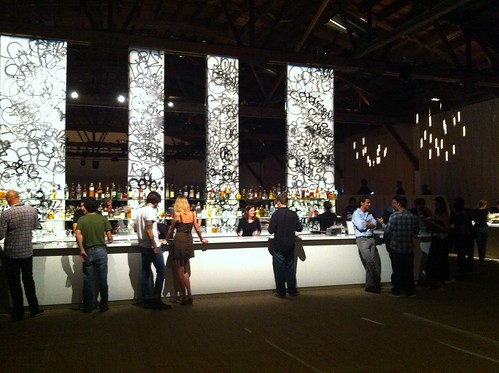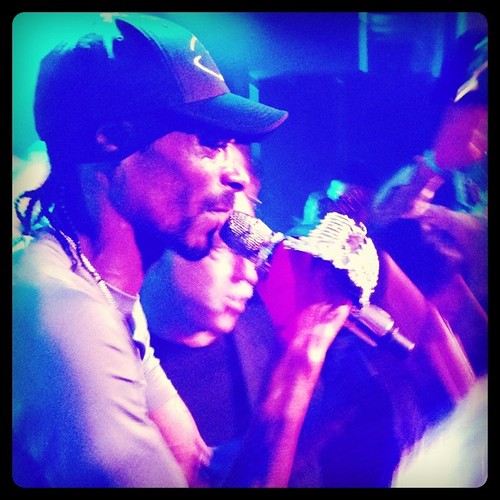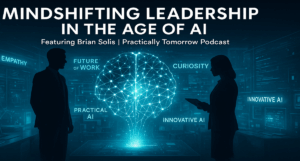
Credit: WireImage, Kevin Mazur – Mark Zuckerberg, Spotify CEO Daniel Ek, Snoop Dogg and Sean Parker
On stage during Facebook’s massive f8 developer conference this past September in San Francisco, Mark Zuckerberg introduced the world to frictionless sharing and the future of music. Freshly minted alliances with Spotify, Turntable.fm, Clear Channel, Rdio and many other services now feed the new “Music” dashboard that transforms friends into social DJ’s and music store clerks. In between their status updates, Facebook’s new frictionless sharing platform turns the news feed into a playlist that spotlights top songs, featured music services, and unknown gems creating a social soundtrack to everyone’s life. The result will naturally spark intrigue, dialogue, listening, and eventually new music purchases courtesy of Facebook’s inherent social effect.
Indeed, the launch of Facebook’s Open Graph represents a historical milestone for Facebook, social networking and for all media. People, relationships, content now seamlessly unite to advance online interactions, promote contextual connections, and amplify media to new audiences through highly visible and influential peer-to-peer engagement. In the process, traditional media earns an incredible boost in value and visibility while opening the doors to new monetization opportunities for artists, labels, and developers.
Mark Zuckerberg calls this “real-time serendipity” and he believes that the new music dashboard along with the company’s new Timeline will “transform” the media industry. This is Facebook’s iTunes moment.
Zuckerberg explained, “It’s amazing how much music you can discover through your friends,. I’m really excited about what this next wave of music companies is doing with Open Graph. They’re not trying to block, they’re trying to get you to listen more and discover through your friends.”
He continued, “You discover a huge amount of new music this way. Listening can spread really quickly through the graph.”
At f8, Mark invited Spotify Chief Executive Daniel Ek to the stage to discuss the significance of the new Spotify integration in Facebook, “Spotify users who connect on Facebook listen to more music on a weekly basis than its customers who don’t use Facebook. They’re also more than twice as likely to pay for music.”
Ek went on to compare music sharing on Facebook to the way people shared music on Napster 10 years ago. The difference now is that Ek believes that that the music industry is finally ready to embrace streaming and sharing to trigger purchases. Just wait until users can create, play, and share playlists without leaving Facebook.
As I shared with the Los Angeles Times, Facebook is putting the ‘me’ in social media. It is becoming the epicenter not only of the experiences that people share but the experiences that they will share. People will create their own media networks that influence the behavior of others.
That evening following f8, Facebook founding president and Napster co-founder Sean Parker hosted a lavish but intimate gala for Spotify and 300 influencers in tech and music. Parker is a noteworthy investor in Spotify with speculation that he may have invested as much as $15 million in the popular startup. That evening however, was merely a small demonstration of the authority Facebook, Spotify and Parker wield today.
To celebrate music and the future of social media, Sean Parker did what Sean Parker does best, create a spectacle to attract attention and spark controversy and conversation. Organized in a mere 48 hours, Parker and team converted an empty San Francisco warehouse into a magnificent display of artistry, style, and opulence that would make even the most exclusive lounge or club gawk with admiration. I can only raise a toast to event planner Stanlee Gatti and marvel at his work. (Pictures of the event are here).
Although reminiscent of the over-the-top parties forever tied to the implosion of Web 1.0, this event shared nothing with the dotcom events of the past. This really was about a celebration of music, technology, years of struggle and innovation, all neatly packaged with a sense of progress and accomplishment.
To kick things off, Parker invited Spotify’s Ek to the stage to discuss the state and future of social music.
Parker expressed support for streaming music services such as Spotify naturally and believes that these services represent the death of piracy and a rebirth of music sales. Parker compared the social and digital trends of shared music today to his earlier work with Napster, “This is actually very similar to what I dreamt of 10 years ago. We never really wanted to create a service to destroy the record business or hurt artists in any way. The goal was really to create a more frictionless system. We really believed we would succeed in striking deals with the record labels. Solving the piracy problem can’t happen unless you build a service that’s more convenient than piracy. In a sense Spotify actually competes with piracy.”
In an interview with Billboard, Parker shared his vision for the future of music and Spotify in particular, “Ad-supported, free streaming is the gateway drug to subscriptions and purchases, and what Spotify ultimately sells is portability, and convenience. Streams are not the model. Spotify is about trying to get you to make an investment as a consumer.”
Following the discussion, Parker pulled the curtain back to reveal one last surprise of the evening…performances by superstars Jane’s Addiction, The Killers, Snoop Dogg, and Kascade.
“I owe a great debt to Justin Timberlake,” Parker said before turning the stage over to The Killers. “All of the recording artists here might not have shown up if they knew I was a nerd. Maybe they saw the [Facebook] movie and thought I was one of them.”
The Music Revolution Continues to Play On
I remember the early days of peer-to-peer file sharing and why I was drawn to it. See, I am a fan of music. I search for it. listen to it. I create it. I share it. There was a time when buying $20 CDs to listen to my favorite artists seemed like my only option. At that price however, I was limited in my music experimentation and exploration. My musical tastes were growing “safer” and becoming predictable because I was restricted by cost, so I went with what I knew. Like many, I found myself taking to P2P networks to download new sings and albums to once again expand my musical horizons. For those I truly enjoyed, I would go out of my way to buy either CDs or official digital downloads. Over the years, Pandora, iTunes, Last.fm, and many web-based musical services and networks opened my eyes, ears and wallet to new artists. My tastes and appreciation for music were never more alive.
A funny thing happened over the years however. While music P2P file sharing was alive and clicking, my budget for musical endeavors was on the rise because of it. CDs, downloads, concerts, merchandise, you name it, I was buying it. As I was introduced to new music at no cost, I would eventually buy the tracks or albums I truly enjoyed. And then as a true music fan, I would inevitably indulge in all that enlivened it through other sensory experiences.
The revolution in music continues to evolve now fueled by the fervor of the social web combined with the vision of today’s entrepreneurs. New digital and social services continue to pave the long and winding road that will one day create harmony between innovators and the music industry with consumers and artists also benefiting from the ongoing collaboration. Whether its streaming music services powered by digital algorithms such as Pandora or Last.fm or those powered by the human algorithm such as Spotify or Turntable.fm, social is inspiring a new genre of music discovery, sharing, entertainment, and commerce linked by real-time serendipity and influence.
How is frictionless sharing changing how you experience music?
Connect with Brian Solis on Twitter | LinkedIn | Facebook | Google+ | BrianSolisTV
___
The End of Business as Usual: Rewire the way you work to succeed in the consumer revolution
Order now at Amazon | Barnes and Noble | 800CEOREAD.
___
ENGAGE!: The complete guide for businesses to build and measure success on the social web

___
Click here for your favorite infographics…now in 22 x 28 poster format!









I can only imagine that the shift from social commerce to syndicated commerce will help add even more fuel to this new-world music industry.
As more and more artists and producers (corporate or independent) learn how to leverage technology to syndicate consumer purchase interactions, and as more and more consumers become accustomed to buying socially shared music on the fly, the business of music will experience a measurable lift.
As for me, I’m just happy to make new human connections and strengthen existing ones through the sharing of one of life’s great forms of expression.
I love music, and I love both sharing and shared music. But to me that is sharing with a social intention. Is frictionless sharing that? Or is it really sharing with a lot of frictions?:)
Sounds like a great party! So on the serendipitous Spotify now-playing feed, so long as they don’t turn that thing on! There’s a fine line between ham (radio) and cheese. I’m keeping my dial set to where it’s always been for the time being. There’s too much random noise in what my friends are listening to at any given time. But when this turns into social discovery — and to turntabling and playlisting for friends, I may open up the volume a bit. I like a bit of friction in the system. But for Facebook, open graphing experiences was a brilliant move.
Fantastic article – thanks for taking the pictures as well – the iphone is coming along! to allude to a future project underway: Digital assets such as music will be an never ending social holy grail to sharing experiences online. Friction-less UX/UI is going to enable consumption frequency parallel to commerce frequency. Alexander (CEO) of soundcloud brought up an interesting view worth complementing your piece.https://www.youtube.com/watch?v=dLRHhQlKaAA&feature=colike cheers!
While we still haven’t been given access to Spotify up here in Canada yet, I still understand the point you’re trying to make here Brian. As a huge music fan myself I’m constantly looking for new and good music that I can check out. Eventually this leads me to buying whole albums of artists I didn’t know a week ago and then going to their shows to spend more money. I think this is something that will change the music business forever.
This is a great example of the open graph at work. It’s the same way with sharing of other content on the web. I have a bunch of websites and blogs that I frequent, but I have a ton of friends that have very different taste than I. By us all sharing it opens up the possibilities of finding new and interesting things that we may not have known about before, and it all comes from trusted sources, our friends.
While I still have a few beefs with the idea of frictionless sharing of everything (I don’t want everyone to know ALL the weird places I frequent on the web), I generally think that this openness will lead to people expanding their horizons on everything from what music they listen to, what blogs they read, etc, all based on their networks recommendations.
Now if only I can get people to know that I’m a big music and social person so I can get into one of those parties next time around 😉
Cheers,
Sheldon, community manager for Sysomos
Really nice ! Ilike snoop dog!
that is a really good post
Thank you for sharing this article. I love it. Keep on writing this type of great stuff.
Facebook is a place where singers are taking a lot of benefit from facebook.
Great thjisisireally ncie!
Snoopy Doggy!
With this concept, we will get to know more of our friends just like you’ve mention. I think this feature will make a lot of changes to facebook timeline’s appearance. I can’t wait to know the FB users’ feedback when they got to use it.